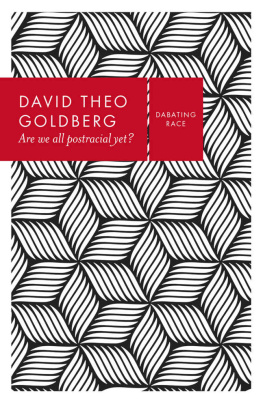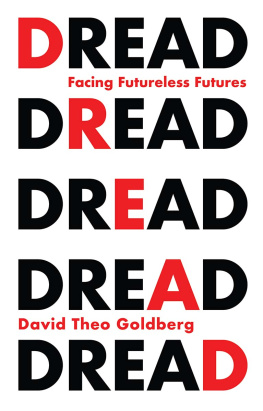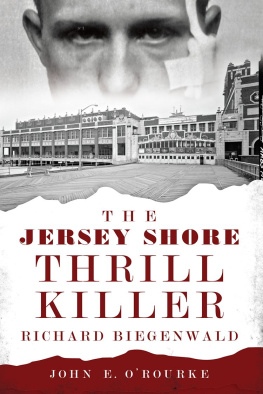THE RETREATS OF RECONSTRUCTION
RECONSTRUCTING AMERICA
Andrew L. Slap, series editor
The Retreats of Reconstruction
Race, Leisure, and the Politics of Segregation at the New Jersey Shore, 18651920
David E. Goldberg
FORDHAM UNIVERSITY PRESS
NEW YORK
2017
Frontispiece: Asbury Park, 1920. Courtesy of the Asbury Park Library.
Copyright 2017 Fordham University Press
All rights reserved. No part of this publication may be reproduced, stored in a retrieval system, or transmitted in any form or by any meanselectronic, mechanical, photocopy, recording, or any otherexcept for brief quotations in printed reviews, without the prior permission of the publisher.
Fordham University Press has no responsibility for the persistence or accuracy of URLs for external or third-party Internet websites referred to in this publication and does not guarantee that any content on such websites is, or will remain, accurate or appropriate.
Fordham University Press also publishes its books in a variety of electronic formats. Some content that appears in print may not be available in electronic books.
Visit us online at www.fordhampress.com.
Library of Congress Cataloging-in-Publication Data
Names: Goldberg, David E., author.
Title: The retreats of Reconstruction : race, leisure, and the politics of segregation at the New Jersey shore, 18651920 / David E. Goldberg.
Description: First edition. | New York : Fordham University Press, 2016. | Series: Reconstructing America | Includes bibliographical references and index.
Identifiers: LCCN 2016013980 | ISBN 9780823272716 (cloth : alk. paper) | ISBN 9780823272723 (pbk. : alk. paper)
Subjects: LCSH: Atlantic Coast (N.J.)Race relations. | African AmericansNew JerseyAtlantic CoastHistory. | SegregationNew JerseyAtlantic CoastHistory. | RacismNew JerseyAtlantic CoastHistory. | Atlantic Coast (N.J.)History.
Classification: LCC F142.J4 G65 2016 | DDC 305.8009749dc23
LC record available at https://lccn.loc.gov/2016013980
Printed in the United States of America
19 18 17 5 4 3 2 1
First edition
for my mother and father, Carla Hope and Michael Goldberg
Contents
On July 23, 1893, an editorial in the Philadelphia Inquirer asked frustrated business owners and tourist promoters of Atlantic City What are we going to do with our colored people? Noting that never before had the resort community seemed so overrun with the dark skinned race as this season, Atlantic City and other popular northern resort destinations struggled throughout the Reconstruction era to contain the recreational activities and consumer demands of black pleasure seekers. As these struggles reveal, contests over segregation were not restricted to former plantation districts, northern legislatures, the workplace, or public transportation systems. In the late nineteenth century, the popularity of the New Jersey shore coincided with growing concerns over civil rights. On beaches and boardwalks, and inside amusement venues and hotel dining halls, African Americans claims for integrated leisure were imbedded in political debates over the meaning of race and the rights and health of consumers.
For the northern white tourists who visited the beach resorts of the New Jersey coast, summer vacations were not just valuable moments away from work or idle time to spend with family and friends. In the aftermath of the Civil War, many working-class whites imagined the Jersey shore as a retreat from the sordid politics of the Gilded Age, the regimentation of industrial order, and the turmoil of black civil rights activism. To these aspiring men and women, summer trips to the seashore offered political opportunities to replace the pretentious social boundaries of antebellum-era resorts with an inclusive public sphere that allowed all white wageworkersregardless of class statusa place to enjoy the fruits of their labor. Writing for Harpers New Monthly Magazine in 1876, Olive Logan explained that the Jersey shore has equal attraction for rich and poor. There is nothing exclusive, she proudly observed, about any of the hotel bathing grounds. Stephen Crane, who visited the popular summertime resort of Asbury Park in the 1880s and 1890s, agreed, remarking that it was the greatest summer resort of Americathe vacation abode of the mighty middle class. At the same time, the promotion of the Jersey shore as a free labor utopia was dependent on
Attending to the broader racial and economic dimensions of what one northern newspaper called the vexatious bathing question, this book examines the political meanings of consumption and racial segregation in northern leisure spaces and the struggle for American Americans civil rights during the late nineteenth and early twentieth century. Despite a large volume of works that focus on the history of race and the cultural politics of Jim Crow during the nineteenth century, we still have an incomplete understanding about how de facto segregationas both a practice and an ideawas implemented and functioned in northern society. In his 1955 classic The Strange Career of Jim Crow, C. Vann Woodward famously remarked that one of the strangest things about the appearance of segregation was that it was born in the North and reached an advanced age before moving to the South in force. Since then, historians who have written about the making of Jim Crow in the North have generally noted the powerful political vocabulary of social equality, miscegenation, and the wages of whiteness in limiting more progressive civil rights initiatives during the Reconstruction period. Whiteness scholars have touted debates over public memory, cultural discussions of wage labor, and the impact of immigration and industrialization as powerful factors in shaping a dominant white supremacy. Other scholars whose research addresses the history of leisure and tourism have focused their attention on public amusements and other popular culture attractions to emphasize the pervasiveness of racial vigilantism in policing these popular nineteenth-century venues. Yet, despite the remarkable saliency of racism in the implementation and daily realities of segregation, whiteness alone did not make segregation at the Jersey shore. Rather, ideas about race and recreation were bound up in local debates about markets and conflicting interpretations about the rights and health of consumers.
This book tells a different story about the making of segregation in the postCivil War North by considering how competing notions of political economy, and not an all-encompassing white supremacy, framed racial politics in the postwar
Throughout the late 1860s, belief in the supremacy of the free labor system guided northern support for the 1866 Civil Rights Act and the Thirteenth, Fourteenth, and Fifteenth Amendments. With these political and legal rights secured, white northerners expressed hope that African Americans would humbly accept the promise of the free labor system and focus their energies toward economic advancement. Yet, when black activists pushed to desegregate popular amusements in the early 1870sefforts that eventually culminated in the passage of the 1875 Civil Rights Act outlawing segregation in public accommodationsmany northern Republicans derided African Americans as enemies of free labor who wished to escape their responsibilities as workers in order to use the federal government to grant unmerited social privileges. As Eric Foner, David Quigley, and Heather Cox Richardson have argued, a commitment to free labor ideology enabled white northerners to discredit the civil rights platform of Radical Republicans and black political leaders without resorting to political violence or racist rhetoric. As a result, white northerners derived comfort from their ability to contain the presence of African Americans in social arenas not already desegregated by wartime emancipation and Reconstruction legislation.








